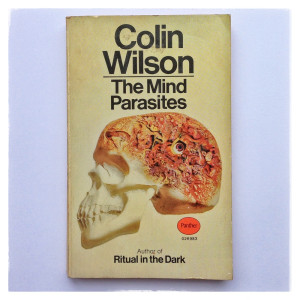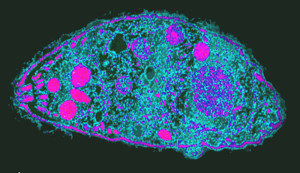If something you can’t quite explain stops you from reading this post, you might be in trouble.

One of the science fiction books that has stuck with me most over the years is Colin Wilson’s The Mind Parasites. Working like a mental cancer, mind parasites infect people they find threatening—generally, brilliant and inquisitive scientists—and consume them with darkness and dread from the inside, causing a rash of suicides across the world.
The narrator of the book starts digging for clues (literally) and finds some basalt monoliths that are part of an underground city (Wilson is a self-proclaimed admitted fan of Lovecraft and the Cthulhu Mythos, and based some aspects of the parasites on Lovecraft’s “Great Old Ones.”) When the narrator and his friends investigate, they all start suffering from headaches, fear, and depression, and they become more convinced that something is “destroying the human power of self-renewal.” They call the mind parasites Tsathogguans—another nod to Lovecraft—and try to figure out how to defeat them.
The book explores some profound existential questions. Who hasn’t thought about historical, societal, environmental, and political problems and wondered how certain trends and movements (Naziism, to name the most obvious) could have taken hold? Who hasn’t decried classism, war, tyranny, unsustainable environmental practices, corruption, etc, and wondered how humans could possibly do the things they do? The Mind Parasites explores the possibility that such atrocities are caused by “the existence of mind vampires.” Of course, humans are deeply flawed, and the mind parasites may seem like an excuse for appalling and mind-boggling behavior, but Wilson’s examination of those symptoms as rooted in something deep, dark, and unnatural residing within a person’s psyche is creepily compelling. Could we be infected by something akin to mind parasites?

Parasites can drastically change the behavior of animals by turning them into zombies. There are countless horrifying parasites, and some of them focus more on messing with an animal’s mind rather than its body, such as the horsehair worm, which makes insects act like some of the afflicted humans in Wilson’s book. The horsehair worm targets grasshoppers, crickets, cockroaches, and other insects and makes them crave water to the point that the afflicted find a big puddle or pond and drowns itself, leaving the worm to escape, mate, and perpetuate the cycle of infection, because water sources are popular places.
Leucochloridium paradoxum is another mind-controlling parasite that starts life in a pool of fecal matter until a hungry snail eats it. Sounds great already, doesn’t it? It gets worse. This worm then moves into the eyes of the snail, stretching them out to the extent that they look like caterpillars—or more importantly, bird snacks. The poor snail can’t retract them like it usually does. And from there, the worm becomes a mind parasite, forcing the snail into the open where it’s vulnerable and irresistible to birds. The poor snail can only sit idly by as it is forced to meet its doom—or at the very least, lose an eye. And the nefarious parasite hangs out inside the bird with its progeny later being born in the same kind of poop puddle from whence the parent came. Emerald wasps similarly control cockroaches—their favorite egg-laying environment—by injecting venom into the exact area of the roach’s brain that control its ability to flee or defend itself.
Scientists recently learned that parasites can turn plants into zombies too. A team of scientists from the UK published research in PLOS Biology describing how parasitic bacteria control plants such as sugarcane and coconut, making them do crazy things like turning flowers into shoots, changing the color of their petals, and sending up “witches’ brooms,” stalks that function as an open invitation to pollinating insects. These zombified plants can no longer reproduce and become an eating, breeding, and bacteria-transmitting playground for insects. The plant itself is effectively dead and is on the equivalent of life support, existing only to sustain the bacteria and its potent SAP54 protein, which focuses on messing up the plant protein in charge of cell molecules. The bacterial protein and the plant protein do a strange dance that affects the plant’s behavior and that of the insects living and eating there; the presence of the SAP54 protein draws in more insect visitors. Fungi such as Puccinia monoica can also control plants, making them sprout enticing fake flowers full of cells that insects spread to other plants.
As it turns out, plants and animals aren’t the only creatures susceptible to mind parasites. The ones previously mentioned don’t affect humans, but some parasites can. Toxoplasma gondii, a one-celled organism, messes with animals by controlling their survival instincts. Instead of running away from a cat, for example, a mouse infected with this parasite would instead be drawn to the cat. Cats happen to be at the root of this parasite, which was first discovered in 1908. For an unknown reason, Toxoplasma seems capable of sexual reproduction only in a cat’s stomach, from where it hitches a ride down and out the digestive system. And that’s where humans can get the parasites—cat litter. It’s also possible for the parasite to spread through food or water.
Scientists believe 3 billion people around the world have it. Pregnant women are particularly susceptible (this is why you may have heard that pregnant women shouldn’t clean cat litter—it’s not because it’s too hard to stoop down), and the parasite can have particularly damaging effects on fetal tissues and organs. Most people only experience mild, flu-like symptoms, and their immune systems can beat the parasite back into something like remission, but it stays forever in a person’s cells cordoned off in something called a tissue cyst. If the immune system becomes compromised (organ transplants are particularly dangerous in this regard), the parasite can—much like the mind parasites when the scientists start uncovering threatening information—reactivate and wreak havoc.

Toxoplasma gondii
Up to 95% of people in some countries may be carrying these parasites in their brains, including roughly 60 million people in the U.S. The good and the bad news are one in the same: most people don’t demonstrate symptoms of Toxoplasma. But regardless of symptoms, the parasites are hard at work rearranging molecules in brain cells. Because of the high percentages of people who may have this parasite, scientists are starting to wonder whether humans’ health and behavior might be shifting as a result.
In fact, some studies suggest that the parasite “explains a statistically significant portion of the variance in aggregate neuroticism among populations, as well as in the ‘neurotic’ cultural dimensions of sex roles and uncertainty avoidance.” 20-80% of infected humans demonstrate clinically significant behavioral changes , and “in populations where this parasite is very common, mass personality modification could result in cultural change.” This may be more likely in humid regions that rarely or never experience freezing temperatures. Some studies also suggest that “some cases of schizophrenia may be associated with…exposure to the ubiquitous protozoan Toxoplasma gondii” and that some medications used to treat schizophrenia and other disorders are effective against the parasite.
Research has shown a correlation between neuroticism and a high prevalence of the parasite. One of the forms of neuroticism most displayed by infected humans is something called “guilt proneness.” And here I thought that was simply being Jewish or Catholic. I guess if there’s an upside to the parasite, it’s that, according to one research, they “add to our cultural diversity.” Yay?
Suffice it to say, Toxoplasma is one of many strange organisms that stows away in human bodies. It’s tough to isolate the influence of any one factor on our behavior, which is precisely why the prospect of mind parasites is so terrifying. Humans are bizarre creatures, and we’ve only begun to scratch the surface of the concealed forces that make us that way. And while the idea of mind parasites is even more plausible than I suspected, I can’t help but laugh at the idea that we’re possessed by ancient, evil alien forces.

If you happen to be interested in this kind of stuff, especially mind viruses that can cause negative emotions, addictions, aggression, diseases, etc, you may find Dimitar Zahariev’s theory of the Emotional Breakdown Syndrome to be true. The visible mark of the virus / viruses is located in the nape of the neck and doctors commonly call it stork’s bite.
Here is more on this –
https://www.freecom-int.com/clients/esotherica/index1.htm